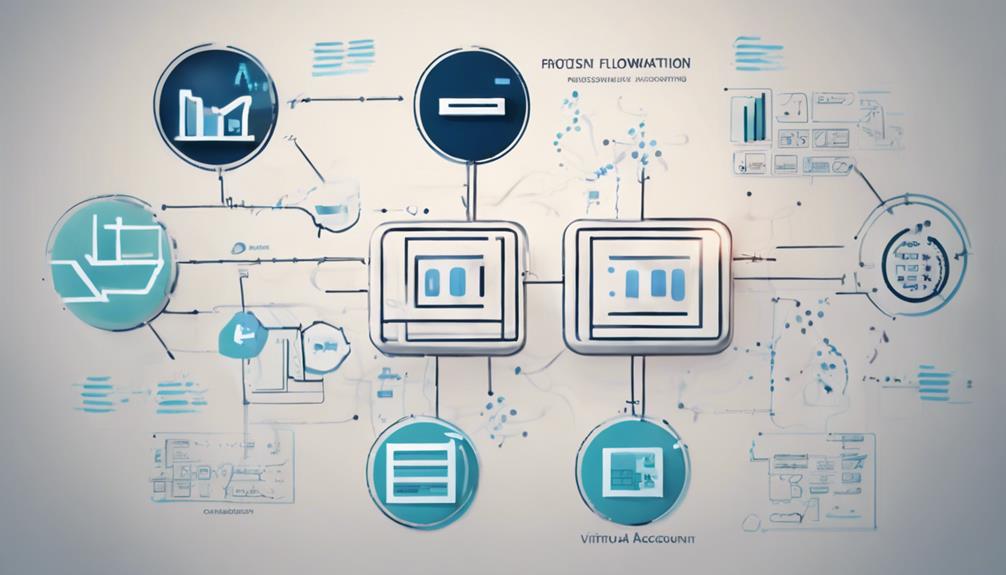When managing an accounting system for non-residents, you may not be aware of the intricate balance required between international financial regulations and local tax laws.
Navigating these complexities demands a strategic approach to ensure compliance and efficiency.
By understanding the nuances of cross-border accounting, you can streamline your processes and optimize your financial operations for sustained success in a global market.
Key Takeaways
- Establish reliable accounting systems for non-residents' financial tracking and compliance.
- Understand non-resident tax regulations to fulfill cross-border tax obligations.
- Implement secure data management practices to safeguard financial information.
- Train staff for efficient accounting operations to ensure accuracy and compliance.
Importance of Reliable Accounting Systems
In navigating the complex landscape of international finance, non-residents must prioritize the establishment of a robust and reliable accounting system to ensure accurate tracking of financial activities and compliance with local regulations. Utilizing advanced accounting software can streamline processes, enhance accuracy, and provide real-time insights into your financial data.
Cloud accounting offers the flexibility of accessing your financial information from anywhere, ensuring seamless collaboration with stakeholders across different locations. Compliance with local regulations is non-negotiable, and a dependable accounting system can help you stay on top of ever-changing requirements, avoiding penalties and legal issues.
By investing in a reliable accounting system, you not only manage your cash flow effectively but also demonstrate transparency and accountability in your financial dealings. This credibility can open doors to new opportunities, strengthen relationships with investors, and foster trust with financial institutions.
Embrace the power of technology and sound accounting practices to navigate the intricacies of international finance successfully.
Understanding Non-resident Accounting Regulations

Navigating the intricate realm of non-resident accounting regulations demands a keen understanding of residency criteria for tax purposes and the potential implications on tax obligations. When dealing with non-resident accounting, it's vital to grasp the following key points:
- Residency Status: Determining your residency status is crucial as it dictates which tax regulations apply to you as a non-resident.
- Tax Obligations: Non-residents may have different tax obligations based on their residency status and the source of income, requiring careful consideration and compliance.
- Tax Treaties: Some countries have tax treaties in place to prevent double taxation for non-residents, providing relief and clarity on tax matters.
- Professional Advice: Seeking guidance from tax professionals can help navigate the complexities of non-resident tax laws, ensuring compliance and avoiding potential issues.
Understanding these aspects of non-resident accounting regulations is essential for fulfilling tax obligations and making informed financial decisions while operating across borders.
Choosing the Right Accounting Software
When selecting the optimal accounting software for non-residents, prioritize features such as multi-currency support, remote access capabilities, cloud-based functionality, integration with payment gateways, and top-notch security measures. Multi-currency support is essential for managing transactions in different currencies efficiently. Remote access capabilities enable non-residents to access financial data from anywhere, enhancing flexibility and collaboration. Cloud-based accounting software ensures real-time access and collaboration with team members across various locations. Integration with payment gateways streamlines online transactions for non-residents, simplifying financial processes. Robust security features are crucial to safeguard sensitive financial information of non-resident clients. To help you better understand the key features to consider, the table below summarizes the essential aspects to look for in accounting software for non-residents:
| Feature | Description |
|---|---|
| Multi-currency Support | Manage transactions in different currencies efficiently. |
| Remote Access | Access financial data from anywhere, enhancing flexibility and collaboration. |
| Cloud-Based Functionality | Real-time access and collaboration with team members across locations. |
| Integration with Payment Gateways | Streamline online transactions for non-residents. |
Implementing Secure Data Management Practices

To ensure robust data security in accounting operations for non-residents, prioritize implementing secure data management practices to safeguard sensitive financial information. Here are key steps to enhance data protection:
- Utilize encrypted cloud backups: Store financial data securely in the cloud with encryption to prevent unauthorized access and ensure data confidentiality.
- Maintain firewall and antivirus software: Regularly update and monitor firewall and antivirus programs to detect and block potential threats, safeguarding accounting information.
- Implement multi-factor authentication: Add an extra layer of security by requiring multiple credentials for account access, reducing the risk of unauthorized entry.
- Conduct regular security audits: Periodically assess data security measures, identify vulnerabilities, and address them promptly to maintain a high level of protection for financial data.
Training Staff for Efficient Accounting Operations

Training staff in efficient accounting operations is essential for optimizing financial processes and ensuring accuracy in record-keeping. By providing your staff with the necessary training, you can significantly improve the precision of financial records, leading to enhanced customer satisfaction through timely and accurate reporting.
Investing in training for your staff can also streamline billing procedures, ultimately improving cash flow management within your organization. Moreover, a well-trained team can effectively identify and rectify errors in financial transactions, contributing to the overall reliability of your accounting system.
Additionally, ensuring that your staff is well-versed in efficient accounting operations will help maintain compliance with tax regulations, reducing the risk of penalties resulting from non-compliance. Overall, prioritizing training for your staff in efficient accounting operations is a strategic investment that can yield numerous benefits for your organization's financial health and regulatory adherence.
Regular Monitoring and Reporting Procedures

After establishing a robust training program for your staff in efficient accounting operations, the next crucial step is implementing regular monitoring and reporting procedures to ensure the accuracy and reliability of your financial records. To achieve this, follow these essential steps:
- Regularly Review Financial Reports: Track income, expenses, and cash flow to maintain accurate monitoring of your financial status.
- Implement Monthly or Quarterly Financial Reviews: Ensure consistency and reliability in your reporting procedures by conducting these reviews regularly.
- Utilize Accounting Software Features: Make the most of your accounting software capabilities to generate detailed reports on financial performance and trends efficiently.
- Conduct Variance Analysis: Compare actual financial results with budgeted or projected figures to identify any discrepancies and take corrective actions promptly.
Establishing Internal Controls for Accuracy

Implement segregation of duties within your organization to safeguard against errors and fraud in financial transactions. By clearly defining roles and responsibilities, you can ensure that no single individual has control over an entire financial transaction from start to finish.
Establishing policies and procedures for financial reporting will further enhance accuracy and consistency. Regularly conducting reconciliations of accounts is essential to promptly identifying any discrepancies or errors that may arise.
Internal audit processes should be implemented to review and evaluate the effectiveness of your internal controls, ensuring that they're operating as intended. Utilize features in accounting software such as access controls and audit trails to monitor and track changes in financial data, providing an additional layer of security and transparency.
Utilizing Cloud-based Accounting Solutions

Cloud-based accounting solutions revolutionize financial management for non-residents by providing seamless access to real-time data from anywhere in the world. Leveraging these systems can greatly benefit non-resident business owners.
- Remote Access: With cloud-based accounting, you can log in and manage your financial information at any time and from any location, ensuring you stay connected to your business no matter where you are.
- Real-time Collaboration: These solutions enable you to collaborate with accountants instantly, ensuring that everyone is working with the most up-to-date financial data, promoting accuracy and efficiency.
- Automation: Cloud accounting software automates repetitive tasks like invoicing and expense tracking, saving you time and reducing the likelihood of errors in your financial records.
- Secure Data Backup: Your financial data is securely stored in the cloud, providing backups that protect your information from loss or damage, giving you peace of mind regarding the safety of your financial records.
Outsourcing Accounting Functions for Expertise

Consider outsourcing accounting functions to gain access to specialized expertise in tax regulations and financial reporting requirements, allowing non-residents to navigate complex local accounting laws effectively. By outsourcing these tasks, you can focus on your core business activities while ensuring compliance with local tax laws and regulations. Outsourced accounting services offer cost-effective solutions compared to hiring full-time in-house accounting staff, making it a practical choice for non-residents. Below is a table highlighting the benefits of outsourcing accounting functions for expertise:
| Benefits of Outsourcing Accounting Functions |
|---|
| Gain access to specialized expertise |
| Ensure compliance with tax regulations |
| Navigate complex local accounting laws |
| Cost-effective compared to in-house staff |
| Focus on core business activities |
Outsourcing accounting functions not only provides expertise in tax regulations but also ensures adherence to local compliance standards without the need for a physical presence. It is a strategic move to enhance the efficiency and reliability of your accounting system.
Conducting Regular Audits for Compliance

When conducting regular audits for compliance, it's essential to understand the importance of compliance audits in maintaining financial integrity.
Planning the frequency of audits allows for a systematic approach to reviewing financial records.
Implementing corrective actions based on audit findings helps enhance internal controls and overall financial management efficiency.
Compliance Audit Importance
Regular compliance audits play a crucial role in ensuring adherence to tax regulations and preventing costly penalties. When conducting these audits, you gain insights into potential errors and discrepancies in accounting records. Additionally, audits provide a chance to review internal controls, processes, and the accuracy of financial reporting. By regularly conducting compliance audits, you maintain the integrity of financial data and show transparency to stakeholders. This process not only builds trust with regulatory authorities but also cultivates a culture of accountability within your organization.
- Identify errors and discrepancies in accounting records.
- Review internal controls, processes, and financial reporting accuracy.
- Maintain the integrity of financial data and demonstrate transparency to stakeholders.
- Build trust with regulatory authorities and foster a culture of accountability.
Audit Frequency Planning
To establish a robust audit frequency plan for compliance, prioritize setting clear timelines for both internal and external audit procedures. Regular audits are crucial for ensuring compliance with regulations and maintaining financial integrity. By conducting audits at planned intervals, transparency and accountability in financial operations are enhanced. Non-residents can benefit significantly from scheduled audits as it helps in upholding a dependable accounting system. Implementing a consistent audit schedule not only ensures compliance but also fosters trust with stakeholders. Below is a table outlining the key aspects to consider when planning audit frequencies:
| Aspect | Description |
|---|---|
| Regulatory Compliance | Ensure adherence to laws and regulations |
| Audit Scope | Define the areas to be audited |
| Resource Allocation | Allocate necessary resources for audits |
| Reporting Timelines | Set deadlines for audit reports |
| Follow-up Procedures | Implement actions based on audit findings |
Corrective Action Implementation
Moving from the imperative need for a dependable accounting system for non-residents, the focus now shifts to the crucial aspect of Corrective Action Implementation through conducting regular audits for compliance. Regular audits are essential for ensuring compliance with tax regulations and preventing potential penalties. Here's how conducting audits for compliance benefits your business:
- Identifying Discrepancies: Audits help in pinpointing errors and discrepancies in financial records.
- Implementing Corrective Actions: Taking necessary steps based on audit findings enhances the accuracy and reliability of your accounting system.
- Insight into Financial Health: Audits provide valuable insights into your business's financial health, aiding in informed decision-making.
- Demonstrating Transparency: Regular audits showcase your commitment to financial transparency and accountability, crucial for non-resident business operations.
Adapting to Changes in Tax Laws

Stay vigilant and informed about changes in tax laws that may impact your business operations as a non-resident. Being aware of tax law changes is crucial for maintaining compliance and avoiding potential penalties. Understand how these changes can affect your financial reporting and accounting practices, as they may require adjustments to ensure accuracy and adherence to regulatory standards.
When faced with complex tax law modifications, seek guidance from tax professionals or accountants who specialize in assisting non-residents. Taking a proactive approach to adapting to new tax laws is essential for sustaining financial stability and regulatory compliance in your operations.
To effectively adapt to tax law changes, regularly review and adjust your accounting system to accommodate any necessary modifications. Ensure that your accounting processes align with the updated tax regulations to prevent any discrepancies. By staying proactive and informed, you can navigate the evolving tax landscape and safeguard your business from potential risks associated with non-compliance.
Continuous Improvement of Accounting Processes

When adapting to changes in tax laws as a non-resident, continuously improving your accounting processes is key to maintaining efficiency and accuracy in financial reporting.
To achieve this, consider the following:
- Implement Regular Reviews: Conducting regular reviews and audits of your accounting processes will help you identify inefficiencies and areas that require improvement, ensuring a more robust system.
- Utilize Automation Tools: Embrace automation tools to streamline repetitive tasks and minimize manual errors within your accounting system, promoting efficiency and accuracy.
- Stay Updated on Best Practices: Keep abreast of industry best practices and technological advancements to enhance the effectiveness of your accounting processes continually.
- Invest in Ongoing Training: Provide ongoing training and development opportunities for your staff. Equipping them with the necessary skills will help maintain a dependable accounting system and foster a culture of continuous improvement.
Frequently Asked Questions
What Is the Easiest Bookkeeping Software to Use?
When it comes to finding the easiest bookkeeping software to use, QuickBooks Online stands out as a top choice.
This platform is user-friendly, affordable, and cloud-based, making it a convenient option for managing your finances.
With its intuitive interface and wide range of features, QuickBooks Online provides a seamless experience for non-residents looking to stay organized and efficient in their accounting tasks.
How Do You Develop an Accounting System?
To develop an accounting system, start by setting clear financial goals and categorizing income and expenses for accurate tracking. Implement reliable software to streamline recording and reporting. Conduct regular financial reviews and audits to ensure accuracy. Seek professional guidance if needed.
Budget planning, data analysis, financial reporting, tax compliance, cash flow, and expense tracking are key components for a dependable system. Follow these steps to establish a robust accounting framework.
In What Ways Does a Credible Accounting System Provide Support to an Organization?
A credible accounting system supports your organization by enhancing efficiency in decision-making, ensuring compliance with regulations, and promoting accuracy in financial reporting.
It provides a solid foundation for tracking transactions, managing resources, and preventing discrepancies. By fostering transparency and accountability, it builds trust with stakeholders and investors.
This system offers vital insights into financial health, aiding in strategic planning and forecasting for sustainable growth.
How Much Does an Accounting Software Cost?
Accounting software costs vary depending on the features you need. Cost breakdown includes monthly subscriptions for cloud-based options or one-time purchases for desktop versions. Additional fees may apply for setup, training, and support.
Consider customer reviews to assess software quality. Pricing tiers often align with user numbers and feature complexity. Evaluate long-term benefits for return on investment when choosing software for your business needs.
Conclusion
In conclusion, sustaining a dependable accounting system for non-residents is crucial for your business's success.
By understanding regulations, choosing the right software, implementing secure data practices, training staff, outsourcing expertise, conducting audits, adapting to tax changes, and continuously improving processes, you can ensure financial stability and growth.
Remember, Rome wasn't built in a day, but with diligence and attention to detail, your accounting system can stand the test of time.